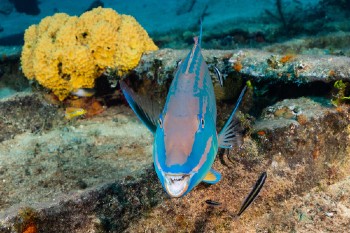Courtney Platt Appeals For Caymanians to Stop Consuming Reef Fish
GEORGE TOWN, Cayman Islands – Well-known underwater photographer and conservationist Courtney Platt is appealing to the community and visitors to stop eating fish caught on local reefs, especially the rapidly disappearing parrot fish.
 According to her, Cayman’s reef fish, along with the coral they feed on, are in crisis.“If you can afford to eat anything else, then please choose to eat anything else,” he told the Cayman news service in a recent interview at the start of the campaign to remove local fish from the menu, at least until the numbers recover.
According to her, Cayman’s reef fish, along with the coral they feed on, are in crisis.“If you can afford to eat anything else, then please choose to eat anything else,” he told the Cayman news service in a recent interview at the start of the campaign to remove local fish from the menu, at least until the numbers recover.
Platt, who has been documenting Cayman’s underwater world for more than four decades with iconic images, said the situation under the sea is now dire.
“ It needs every one of us living here or visiting to think long and hard about consuming reef fish before they disappear from our waters.
Platt says this is not an alarmist position; “fishermen constantly talk about how the fish have declined, a result of years of take that was simply unsustainable. If fishing what little remains continues unabated, there is no doubt that it will be gone completely in just a few years, and with it will go the coral reefs and our beautiful world-renowned beaches.”
Platt said that when he first began diving in the Cayman Islands in the early 1980s, there was an abundance of fish, but a combination of factors, including overfishing, has led to a horrifying decline that will be hard to recover from. But the country must start reversing the trend.
While all the reef fish that people commonly eat, such as snapper, barracuda, triggerfish and grouper, are disappearing, the plight of the parrotfish, which is critically important to replenishing Cayman’s beaches, may be of the most concern.
Platt described one of the three main species of these fish, the blue parrotfish, as the “unicorns of the sea” because he has not seen one in many years. They have become like mythical creatures, as many people have never seen one.
In 2015, Platt captured what is now an exceptionally rare image of three species of parrotfish that were once found in abundance in local waters, which was the last time he said he saw a blue parrotfish.
He said all parrotfish are “super important to our beaches” which are eroding due to a disasteous combination of over-development, climate change and over-fishing of parrotfish. Not everyone is aware that parrotfish literally poo sand. But their numbers are in perilous decline, and most are small because the fish are caught before they can reach maturity. As a result, the natural beach service they provide is being lost.
Platt says he plans to use his extensive catalogue of beautiful images to tell the story of the decline, to explain how it can be reversed, why it should be, and above all to urge people to stop eating reef fish.
He said it was horrendous to realise how few people are aware of the problem and how little they know about how serious the decline in local fish stocks has become.
He added that he wants to raise awareness to such an extent, that people will want, for the sake of their environment, to stop consuming the locally caught fish and eat something else instead.
Pratt noted that a good alternative dish is lionfish, an invasive species that has become prolific, and aggressively competes for food and space with Cayman’s native fish, threatening reef biodiversity.


